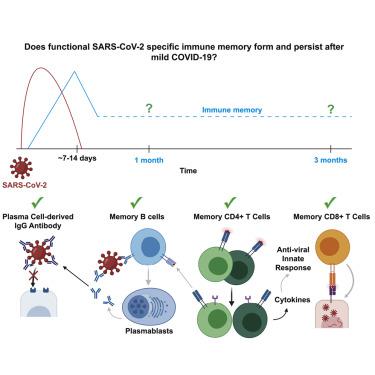Cell ( IF 45.5 ) Pub Date : 2020-11-23 , DOI: 10.1016/j.cell.2020.11.029 Lauren B Rodda 1 , Jason Netland 1 , Laila Shehata 1 , Kurt B Pruner 1 , Peter A Morawski 2 , Christopher D Thouvenel 3 , Kennidy K Takehara 1 , Julie Eggenberger 4 , Emily A Hemann 4 , Hayley R Waterman 2 , Mitchell L Fahning 2 , Yu Chen 3 , Malika Hale 3 , Jennifer Rathe 4 , Caleb Stokes 4 , Samuel Wrenn 5 , Brooke Fiala 5 , Lauren Carter 5 , Jessica A Hamerman 6 , Neil P King 5 , Michael Gale 4 , Daniel J Campbell 6 , David J Rawlings 7 , Marion Pepper 1

|
The severe acute respiratory syndrome coronavirus 2 (SARS-CoV-2) virus is causing a global pandemic, and cases continue to rise. Most infected individuals experience mildly symptomatic coronavirus disease 2019 (COVID-19), but it is unknown whether this can induce persistent immune memory that could contribute to immunity. We performed a longitudinal assessment of individuals recovered from mild COVID-19 to determine whether they develop and sustain multifaceted SARS-CoV-2-specific immunological memory. Recovered individuals developed SARS-CoV-2-specific immunoglobulin (IgG) antibodies, neutralizing plasma, and memory B and memory T cells that persisted for at least 3 months. Our data further reveal that SARS-CoV-2-specific IgG memory B cells increased over time. Additionally, SARS-CoV-2-specific memory lymphocytes exhibited characteristics associated with potent antiviral function: memory T cells secreted cytokines and expanded upon antigen re-encounter, whereas memory B cells expressed receptors capable of neutralizing virus when expressed as monoclonal antibodies. Therefore, mild COVID-19 elicits memory lymphocytes that persist and display functional hallmarks of antiviral immunity.
中文翻译:

轻度 COVID-19 后功能性 SARS-CoV-2 特异性免疫记忆仍然存在
严重急性呼吸综合征冠状病毒 2 (SARS-CoV-2) 病毒正在全球引发大流行,且病例持续上升。大多数感染者都会出现轻微症状的 2019 年冠状病毒病 (COVID-19),但尚不清楚这是否会诱发持久的免疫记忆,从而有助于免疫力。我们对从轻度 COVID-19 中康复的个体进行了纵向评估,以确定他们是否发展并维持多方面的 SARS-CoV-2 特异性免疫记忆。康复者体内产生了 SARS-CoV-2 特异性免疫球蛋白 (IgG) 抗体,可中和血浆以及记忆 B 和记忆 T 细胞,并且持续至少 3 个月。我们的数据进一步表明,SARS-CoV-2 特异性 IgG 记忆 B 细胞随着时间的推移而增加。此外,SARS-CoV-2特异性记忆淋巴细胞表现出与有效抗病毒功能相关的特征:记忆T细胞分泌细胞因子并在再次遇到抗原时扩增,而记忆B细胞在表达为单克隆抗体时表达能够中和病毒的受体。因此,轻度的 COVID-19 会引发记忆淋巴细胞,这些淋巴细胞会持续存在并表现出抗病毒免疫的功能特征。











































 京公网安备 11010802027423号
京公网安备 11010802027423号